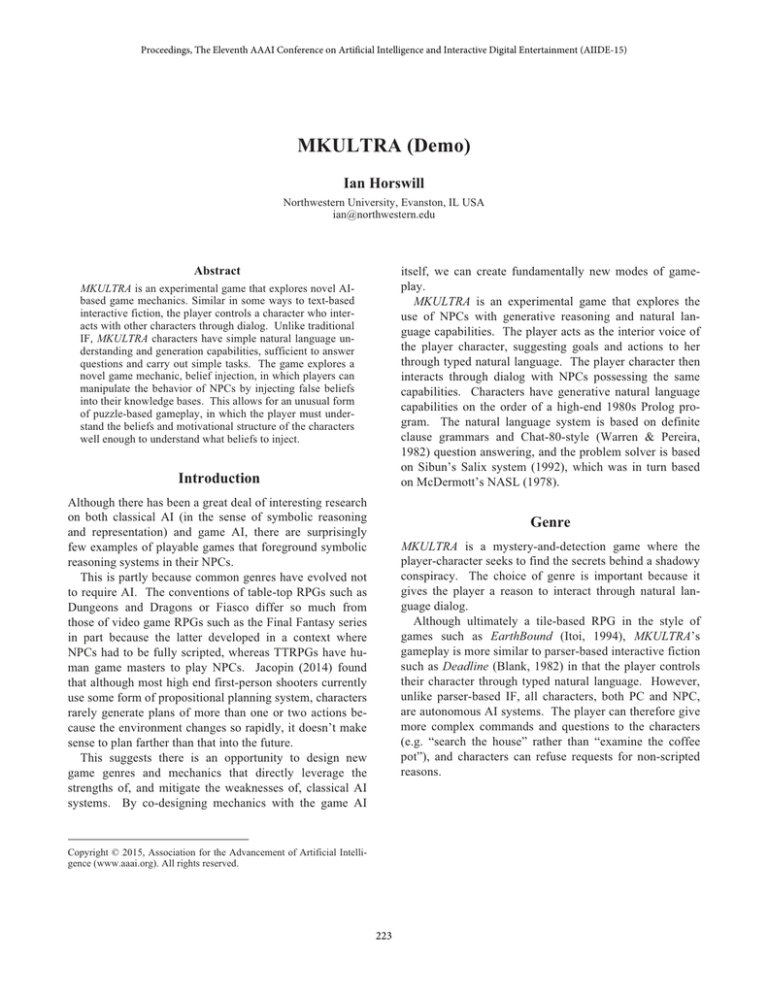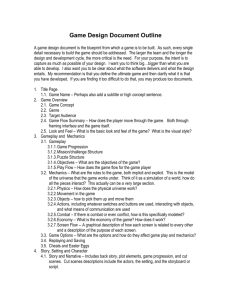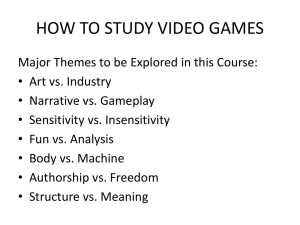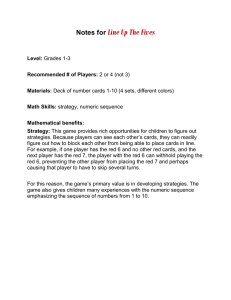
Proceedings, The Eleventh AAAI Conference on Artificial Intelligence and Interactive Digital Entertainment (AIIDE-15)
MKULTRA (Demo)
Ian Horswill
Northwestern University, Evanston, IL USA
ian@northwestern.edu
itself, we can create fundamentally new modes of gameplay.
MKULTRA is an experimental game that explores the
use of NPCs with generative reasoning and natural language capabilities. The player acts as the interior voice of
the player character, suggesting goals and actions to her
through typed natural language. The player character then
interacts through dialog with NPCs possessing the same
capabilities. Characters have generative natural language
capabilities on the order of a high-end 1980s Prolog program. The natural language system is based on definite
clause grammars and Chat-80-style (Warren & Pereira,
1982) question answering, and the problem solver is based
on Sibun’s Salix system (1992), which was in turn based
on McDermott’s NASL (1978).
Abstract
MKULTRA is an experimental game that explores novel AIbased game mechanics. Similar in some ways to text-based
interactive fiction, the player controls a character who interacts with other characters through dialog. Unlike traditional
IF, MKULTRA characters have simple natural language understanding and generation capabilities, sufficient to answer
questions and carry out simple tasks. The game explores a
novel game mechanic, belief injection, in which players can
manipulate the behavior of NPCs by injecting false beliefs
into their knowledge bases. This allows for an unusual form
of puzzle-based gameplay, in which the player must understand the beliefs and motivational structure of the characters
well enough to understand what beliefs to inject.
Introduction
Although there has been a great deal of interesting research
on both classical AI (in the sense of symbolic reasoning
and representation) and game AI, there are surprisingly
few examples of playable games that foreground symbolic
reasoning systems in their NPCs.
This is partly because common genres have evolved not
to require AI. The conventions of table-top RPGs such as
Dungeons and Dragons or Fiasco differ so much from
those of video game RPGs such as the Final Fantasy series
in part because the latter developed in a context where
NPCs had to be fully scripted, whereas TTRPGs have human game masters to play NPCs. Jacopin (2014) found
that although most high end first-person shooters currently
use some form of propositional planning system, characters
rarely generate plans of more than one or two actions because the environment changes so rapidly, it doesn’t make
sense to plan farther than that into the future.
This suggests there is an opportunity to design new
game genres and mechanics that directly leverage the
strengths of, and mitigate the weaknesses of, classical AI
systems. By co-designing mechanics with the game AI
Genre
MKULTRA is a mystery-and-detection game where the
player-character seeks to find the secrets behind a shadowy
conspiracy. The choice of genre is important because it
gives the player a reason to interact through natural language dialog.
Although ultimately a tile-based RPG in the style of
games such as EarthBound (Itoi, 1994), MKULTRA’s
gameplay is more similar to parser-based interactive fiction
such as Deadline (Blank, 1982) in that the player controls
their character through typed natural language. However,
unlike parser-based IF, all characters, both PC and NPC,
are autonomous AI systems. The player can therefore give
more complex commands and questions to the characters
(e.g. “search the house” rather than “examine the coffee
pot”), and characters can refuse requests for non-scripted
reasons.
Copyright © 2015, Association for the Advancement of Artificial Intelligence (www.aaai.org). All rights reserved.
223
For example, if you tell a character to eat another character, it will reply “that would be immoral” on the grounds
that the action would result in the death of a character who
was previously living, and the action was not self-defense.
If on the other hand, you can convince the character that
eating the other character would not be murder (see below), then they will do it.
Game Mechanics
MKULTRA involves two novel game mechanics: belief
injection, and the sonification of NPC reasoning processes.
These both allow for new kinds of puzzle-based gameplay.
Belief injection
The game allows the player to place false beliefs directly in
the knowledge bases of NPCs, thereby changing their behavior. This creates a puzzle for the player to understand
enough about the reasoning processes of the character to
know what belief(s) to inject such that the character will
perform the desired actions.
For example, in the demo level, the player attempts to
find an item stolen by an NPC who is a member of the Bavarian Illuminati. The NPC will not divulge the location of
the item to characters who are not themselves members of
the Illuminati, and so will lie when questioned about it.
The player can solve the problem by injecting any number
of the beliefs into the mind of the NPC, such as:
Figure 1 Screenshot from the game
At the moment, this mechanic has not been extensively
explored. It allows the player to know how hard the character is thinking (based on how much audio is generated),
and in extreme cases what they are thinking (if they can
learn to recognize the sound of the character lying). But
one of the goals of the system is modulate the timbre of the
sound based on the character’s affective state and their
intentions toward the player character.
• The player character is also member of the illuminati.
The NPC will then happily divulge the location of the
object.
• The player character is absent. The NPC will then ignore the fact that the PC is obviously searching the house
• The NPC is an orange and is also very hungry. The NPC
will obligingly commit suicide through autocannibalism, thereby freeing the PC to inspect the house.
Implementation status
The game is currently a tech demo, since the only gameplay is a demo level. The system built in Unity (Unity
Technologies, 2004). The AI code is written in a homebrew dialect of Prolog. The AI engine is feature complete;
it includes natural language parsing and generation, question answering, dialog, problem solving, and in-engine
debugging tools. The system also includes a simple beat
sequencer patterned loosely on Façade (Mateas & Stern,
2005) and quip manager based on the work of Short and
Evans (2014).
The system has also been used in an upper division undergraduate course on character AI in which students
worked with the MKULTRA codebase. Student projects
with the codebase were limited, but because of the amount
of time required to cover introductory material, particularly
AI sonification
One of the important open problems in game AI involves
how to communicate the internal state of an AI system to
the player. As an experiment in this direction, MKULTRA
includes a sound synthesizer that is driven by a log of the
activity of an NPC’s problem solver, thereby allowing the
player to “hear the character think” in real time.
The synthesizer uses granular synthesis (Roads, 1996),
using FM synthesis for the grains (Chowning, 1973). Each
time the character’s AI system performs an important operation, such as considering a goal reduction, choosing
between alternate goal reductions, or deciding whether to
lie, it plays a short (3-7ms) “grain” of sound whose spectrum depends on the type of event.
224
Prolog programming, but students were able to use it to
make simple question-answering applications, and to modify the grammar. In addition, a number of the students
asked if a follow-on course could be taught, which is encouraging.
Conclusion
MKULTRA is an experiment in designing novel AI-centric
gameplay. Although still a work in progress, our hope is
that by designing new mechanics and genres around the
capabilities (and limitations) of AI systems, that we will be
able to explore fundamentally new modes of gameplay.
Another goal of the system is for it to be usable as a base
for game AI and interactive narrative researchers to start
from when implementing new systems. It’s impractical for
most Ph.D. students to begin their dissertations by implementing the infrastructure required for a game like MKULTRA or Façade. By making MKULTRA open-source and
teaching a class with it, I hope to put it in a condition
whereby it would be practical for researchers wishing to
work on drama management, for example, to start from a
working system and focus on implementing the functionality important for their research, rather than writing tile editors or parser-generators.
References
Blank, M. (1982). Deadline. Cambridge, MA, USA: Infocom.
Chowning, J. (1973). The Synthesis of Complex Audio Spectra
by Means of Frequency Modulation. Journal of the Audio
Engineering Society, 21(7).
Evans, R., & Short, E. (2014). Versu - A Simulationist
Storytelling System. IEEE Transactions on Computational
Intelligence and AI in Games, 6(2), 113–130.
Itoi, S. (1994). EarthBound. Nintendo Co., Ltd.
Jacopin, E. (2014). Game AI Planning Analytics : The Case of
Three First-Person Shooters. In Proceedings of the Tenth Annual
AAAI Conference on Artificial Intelligence and Interactive
Digital Entertainment (AIIDE 2014) (pp. 119–124).
Mateas, M., & Stern, A. (2005). Façade.
McDermott, D. (1978). Planning and acting. Cognitive Science,
2(2), 71–100.
Roads, C. (1996). The Computer Music Tutorial. Cambridge,
MA, USA: MIT Press.
Sibun, P. (1992). Locally Organized Text Generation. University
of Massachusetts, Amherst.
Unity Technologies. (2004). Unity 3D. San Francisco, CA.
Warren, D. H. D., & Pereira, F. C. N. (1982). An efficient easily
adaptable system for interpreting natural language queries.
Computational Linguistics, 8(3-4), 110–122.
225








